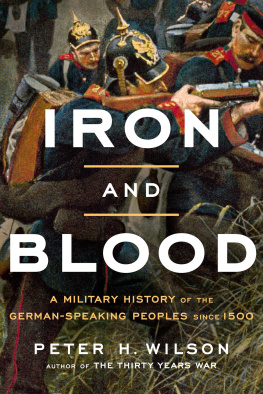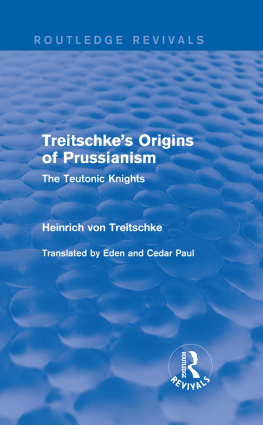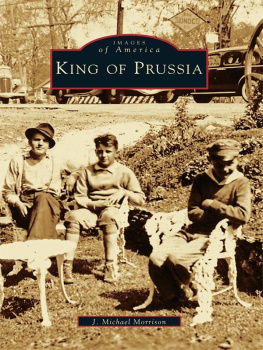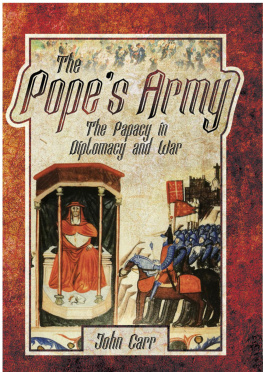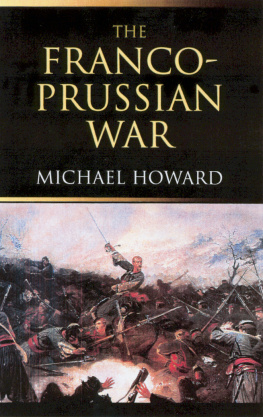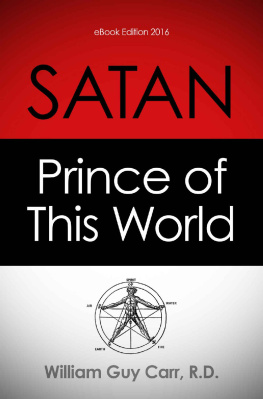THE ORIGINS OF THE WARS OF GERMAN UNIFICATION
ORIGINS OF MODERN WARS
General editor: Harry Hearder
Titles already published:
THE ORIGINS OF THE FRENCH REVOLUTIONARY WARS
T.C.W. Blanning
THE ORIGINS OF THE CRIMEAN WAR
David M. Goldfrank
THE ORIGINS OF THE ITALIAN WARS OF INDEPENDENCE
Frank J. Coppa
THE ORIGINS OF THE AMERICAN CIVIL WAR
Brian Holden Reid
THE ORIGINS OF THE WARS OF GERMAN UNIFICATION
William Carr
THE ORIGINS OF THE SOUTH AFRICAN WAR, 18991902
Iain R. Smith
THE ORIGINS OF THE RUSSO-JAPANESE WAR
Ian Nish
THE ORIGINS OF THE FIRST WORLD WAR
(Second Edition)
James Joll
THE ORIGINS OF THE RUSSIAN CIVIL WAR
Geoffrey Swain
THE ORIGINS OF THE SECOND WORLD WAR IN EUROPE
P. M. H. Bell
THE ORIGINS OF THE SECOND WORLD WAR IN ASIA AND THE PACIFIC
Akira Iriye
THE ORIGINS OF THE GREEK CIVIL WAR
David H. Close
THE ORIGINS OF THE KOREAN WAR
Peter Lowe
THE ORIGINS OF THE VIETNAM WAR
Anthony Short
THE ORIGINS OF THE ARAB-ISRAELI WARS
(Second Edition)
Ritchie Ovendale
THE ORIGINS OF THE WARS OF GERMAN UNIFICATION
William Carr
First published 1991 by Pearson Education Limited
Fourth impression 1999
Published 2013 by Routledge
2 Park Square, Milton Park, Abingdon, Oxon OX14 4RN
711 Third Avenue, New York, NY 10017, USA
Routledge is an imprint of the Taylor & Francis Group, an informa business
Copyright 1991, Taylor & Francis.
All rights reserved. No part of this book may be reprinted or reproduced or utilised in any form or by any electronic, mechanical, or other means, now known or hereafter invented, including photocopying and recording, or in any information storage or retrieval system, without permission in writing from the publishers.
Notices
Knowledge and best practice in this field are constantly changing. As new research and experience broaden our understanding, changes in research methods, professional practices, or medical treatment may become necessary.
Practitioners and researchers must always rely on their own experience and knowledge in evaluating and using any information, methods, compounds, or experiments described herein. In using such information or methods they should be mindful of their own safety and the safety of others, including parties for whom they have a professional responsibility.
To the fullest extent of the law, neither the Publisher nor the authors, contributors, or editors, assume any liability for any injury and/or damage to persons or property as a matter of products liability, negligence or otherwise, or from any use or operation of any methods, products, instructions, or ideas contained in the material herein.
ISBN 13: 978-0-582-49148-9 (pbk)
BRITISH LIBRARY CATALOGUING IN PUBLICATION DATA
Carr, William, 1921
The origins of the wars of German unification. (Origins of modern wars).
1. Germany, 18151871
I. Title II. Series
943.07
LIBRARY OF CONGRESS CATALOGING-IN-PUBLICATION DATA
Carr, William, 1921
The origins of the wars of German unification/William Carr.
p. cm.(Origins of modern wars)
Includes index.
Includes bibliographical references.
ISBN 058291479(cased). ISBN 0582491487 (pbk.)
1. GermanyPolitics and government18481870. 2. GermanyHistory. Military19th century. 3. Prussia (Germany)Foreign relations18151870. 4. SchleswigHolstein War, 1864Causes. 5. Austro-Prussian War, 1866Causes. 6. Franco-German War, 18701871Causes. I. Series.
DD210.C37 1991 | 9036318 |
943.07dc20 | CIP |
CONTENTS
AHR | American Historical Review |
APP | Die auswrtige Politik Preussens 18581871 |
DPO | Quellen zur deutschen Politik sterreichs 18591866 |
GW | Bismarck. Die gesammelten Werke |
HT | Historisk Tidskrift |
HZ | Historische Zeitschrift |
JMH | Journal of Modern History |
OD | Les origines diplomatiques de la guerre de 1870/1: Recueil des documents officiels |
RKN | Die Rheinpolitik Kaiser Napoleon IIIs von 1863 bis 1870 |
SF | Statsraadets forhandlinger 18481912 |
ZGSHG | Zeitschrift der Gesellschaft fr Schleswig-Holsteinische Geschichte |
For the ninth volume in the series on the Origins of Modern Wars I have the privilege to present a new work by Professor William Carr. Like the previous volumes in the series, it is valuable both as a work of considerable scholarship, and as a further illustration of the complexity of the general question as to why governments have resorted to the murderous method of warfare in attempts to solve their problems, attempts which were only rarely successful in doing so.
The scholarship behind William Carrs book is immediately obvious, and has enabled him to reduce the Schleswig-Holstein Question, and the no less complicated German Question before 1866, to lucid and convincing accounts. It has further enabled him to give a gripping and fascinating account of the crisis which led to the war of 1870, an account in which Bismarcks own elegant, but untruthful, version is set in its proper perspective.
Bismarck, with his amoral and wholly Prussia-centred policy, exploited, but ultimately by-passed, the ideologues, so far as these wars are concerned. The German national liberals might have fought an ideological war against Denmark over Schleswig-Holstein, and against Austria over the German Question, but Bismarck ensured that no wild ideologies would turn the wars into totalitarian ones. In this sense, a Bismarck in 1914, or in Washington in the 1960s, might have saved humanity much suffering, even though doing good for humanity was not one of Bismarcks preoccupations.
One question which came to the fore in Professor Nishs masterly study of the Origins of the Russo-Japanese War of 1904 is again relevant to the origins of the GermanDanish War of 1864: what is the responsibility of the Great Powers who are and intend to be neutral, to stop the war from starting? In 1904 Britain and France perhaps did not try hard enough to prevent a war between Russia and Japan, which in human terms was a very terrible one. In 1864 the Danes hoped that the Great Powers again, Britain and France would discourage the German Confederation from going to war over Schleswig-Holstein. In Carrs words, had the international situation not been favourable, Austria and Prussia would scarcely have gone to war.
On the vexed question of the primacy of domestic over foreign policy or vice versa Professor Carr has much to say, Certainly, he writes, it is far too simplistic an explanation of Bismarcks foreign policy to attribute it to a conscious attempt to escape the implications of the domestic crisis, Yet he recognises the mutual independence of the two, and so reminds us that individual political leaders do not ask themselves: Am I, at this moment, concerned with domestic, or foreign, policy?


